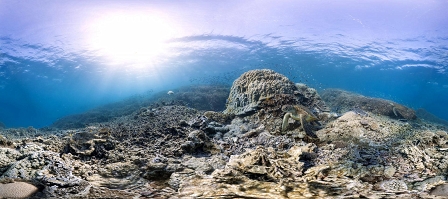Erstellt am: 27. 5. 2016 - 15:05 Uhr
Australia omitted from UN report: Climate Censorship?
The Guardian is reporting today that all mentions of Australia were removed from the final version of a UNESCO report on climate change and world heritage sites.
It says the omissions, which included concerns about the ecological state of the Great Barrier Reef and of unique forests in Tasmania - were made after the Australian government objected on the grounds it could impact on tourism.

XL Catlin Seaview Survey
No sections about any other country were removed from the report. The removals left Australia as the only inhabited continent on the planet with no mentions.
I reached one of the scientific reviewers of the section on the reef that was apparently axed from the final version. Professor Will Steffen is a climate change expert and researcher at the Australian National University in Canberra. Steffen is also the head of Australia’s Climate Council.
So has a major United Nations report on the state of the environment been doctored for business interests?
Will Steffen: Well, that certainly seems to be the case, on the surface. There was a report that was done by UNESCO, UNEP (United Nations Environment Programme), and the Union of Concerned Scientists about world heritage sites around the world, the impacts of climate change, and the risks for tourism. I reviewed one of the case studies which was the Great Barrier Reef, along the Australian coast and, apparently, there were two other pieces about Australian world heritage sites. I did that back in January. Earlier this week, I saw an advance copy of the final report, and I was amazed to see there was nothing about Australia in it, even though my name was still listed as a reviewer.
So, obviously, something had been taken out and we later learned that this withdrawal of the Australian material was at the request of the Department of the Environment in the Australian government, ostensibly because it may have affected the tourism industry.
You might understand the concerns of the tourism board and industry, that they don’t want to put people off coming to Australia, but environmentalists would argue that the need to protect the Great Barrier Reef and other aspects of the environment in Australia, is far more important.
Will Steffen: Well, indeed, there is a cause for concern in the tourism industry, but I think the problem is, looking at this in the short term. If you look at the next two or three years, four years, yes, some bad press may affect the tourism industry a bit, but the problem is, you also have to look at the long term. The long term risks posed by climate change are much more serious for the long term future of the Reef, both as an environmental asset to world heritage, and as a tourism asset.

XL Catlin Seaview Survey
To put it in simple terms, if the coral bleaching continues, if the corals die off and the fish have no homes, then there won’t be much for tourists to come and see in a few decades time.
Will Steffen: Indeed, that’s true, and where we see areas where we see severe bleaching has led to immediate mortality, in other words, we know that the corals won’t recover, they are already converting into an algae based system – sort of green slimy plants over the dead coral, and most of the fish have disappeared.
Nobody is going to spend thousands of dollars to fly down to Australia to see an ecosystem like that. So there is definitely a concern that if we don’t get climate change under control, not only are there problems in the short term, there is absolutely no future in the long term for the tourism industry up there. So it’s a really serious threat.


